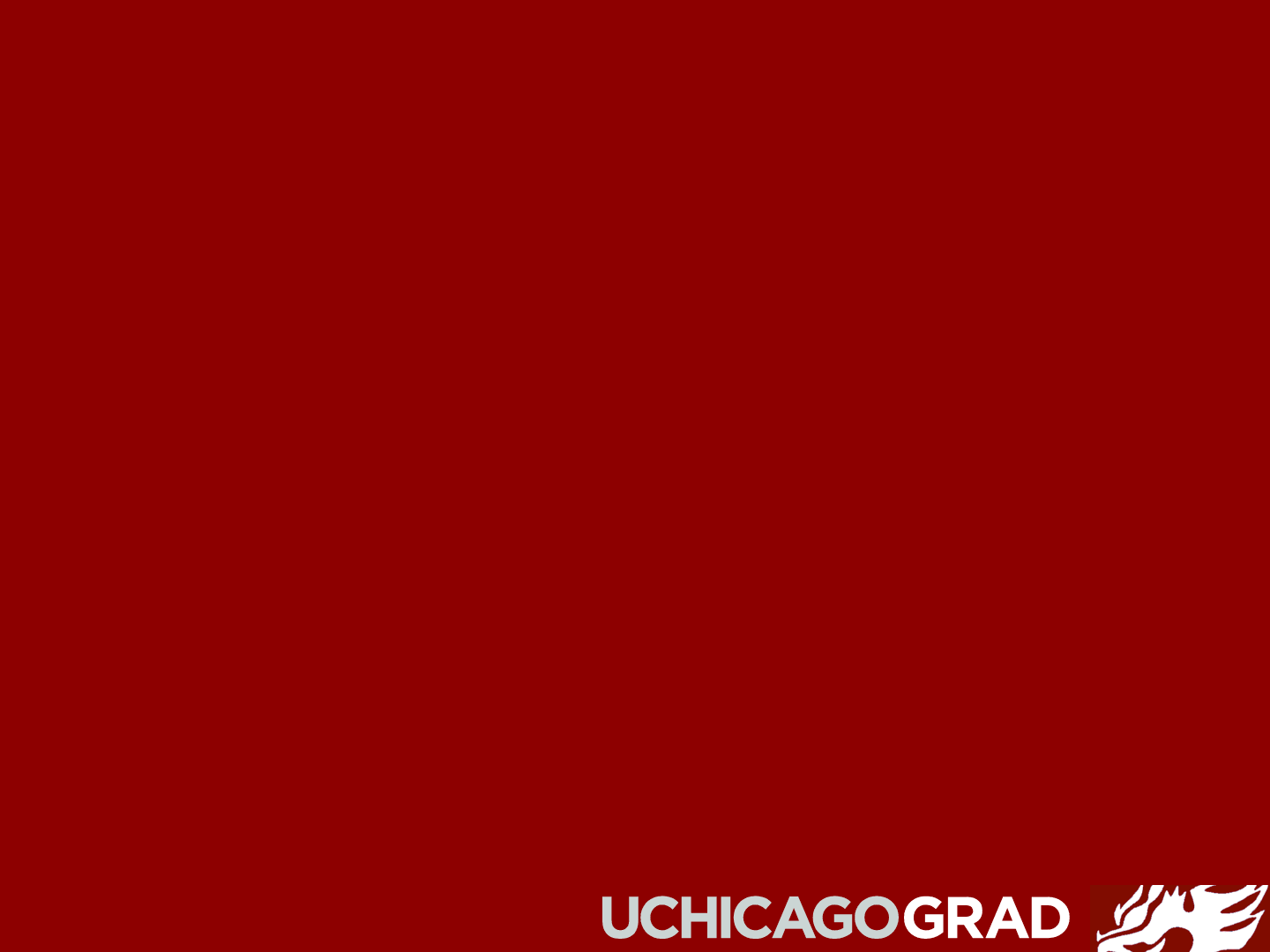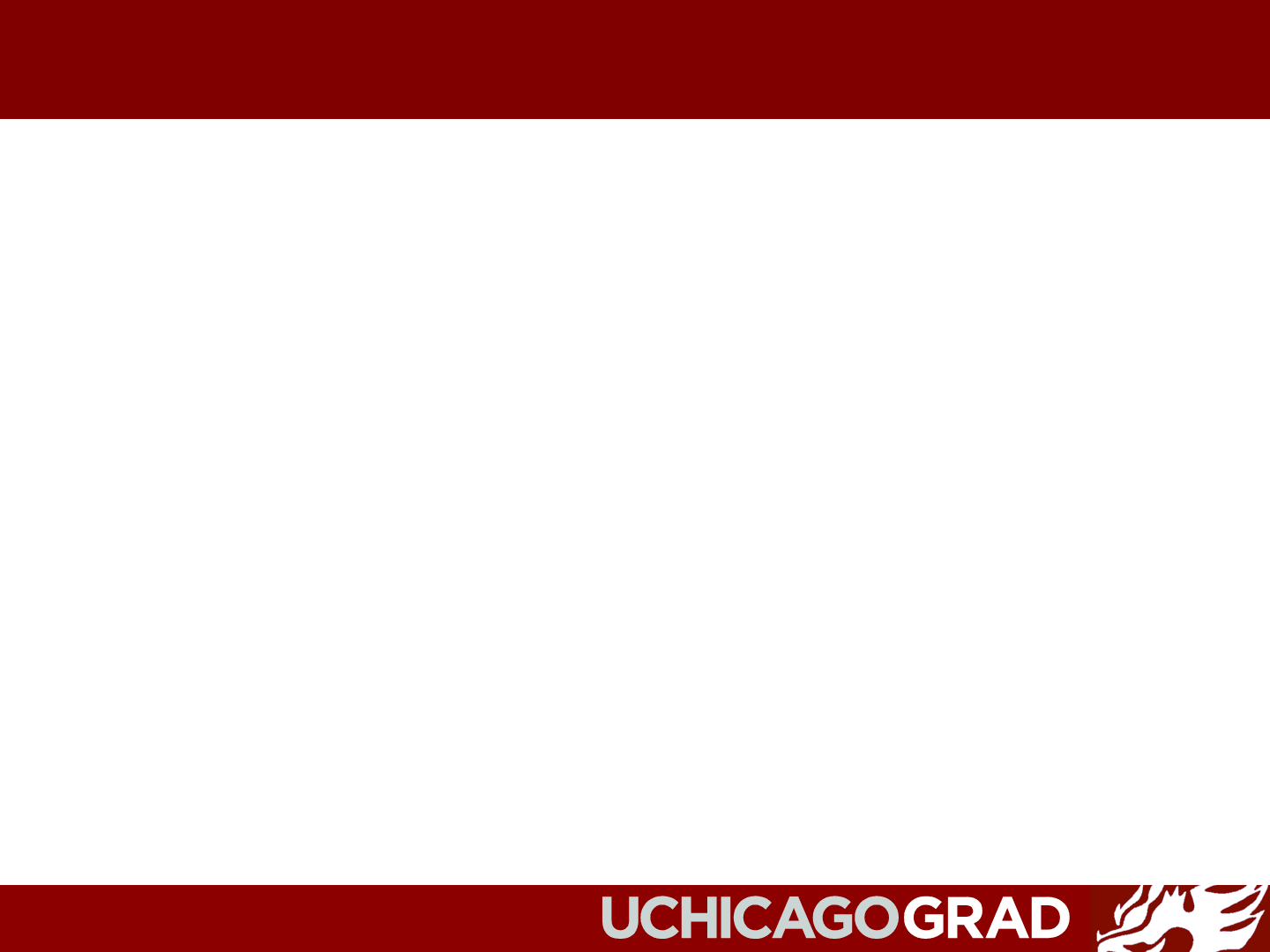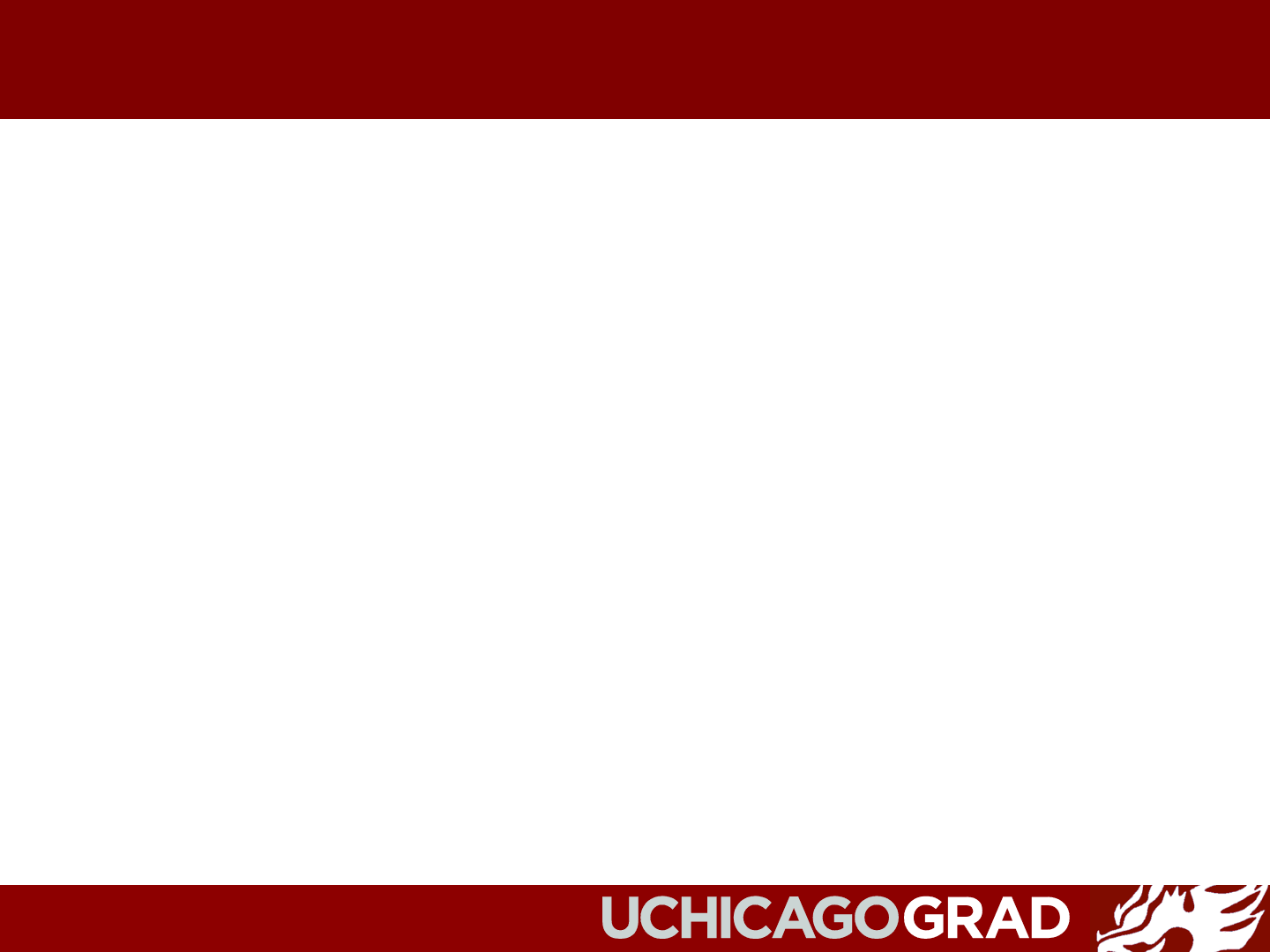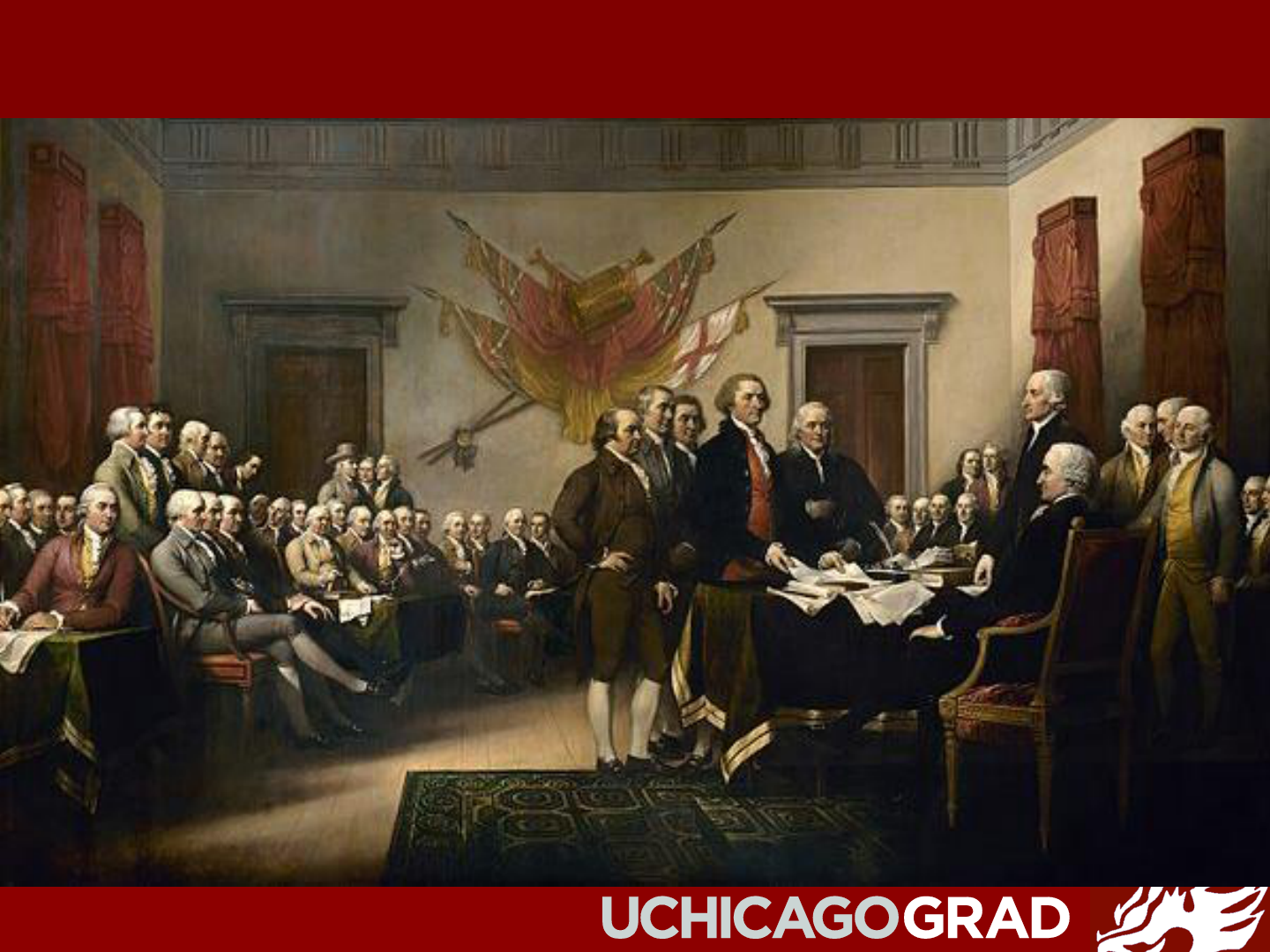
grad.uchicago.edu
Research Statements and Proposals
An Introduction for Humanists and Social Scientists

grad.uchicago.edu
Agenda
Statements vs. Proposals
Writing the Research Statement
Writing the Research Proposal
What the Committees Seek
Samples and Discussion

grad.uchicago.edu
Agenda
Statements vs. Proposals
Writing the Research Statement
Writing the Research Proposal
What the Committees Seek
Samples and Discussion

Career Advancement
The Ask
grad.uchicago.edu
“a statement of research/scholarship interests”
“a proposal not to exceed 1,500 words, double-
spaced, describing the general scope of the project
and the specific work proposed during the
fellowship term”
“a statement of current and future research plans”
“a brief summary of your research interests”
“a statement of plans for work and their relation to
the community’s theme”
“research statement of the project to be undertaken
during the fellowship period”
“a description of research activities”
“a research plan of no more than 2000 words”

grad.uchicago.edu
What kind of position
are you seeking?
Who is your
audience?

Statements vs. Proposals
grad.uchicago.edu
Research Statement Research Proposal
Purpose
To apply for tenure-track
professorships and VAPs
To apply for predoctoral and
postdoctoral fellowships
Scope
Describes past, present,
and future scholarship
Proposes project(s)
to be completed during
a set time period
Topics
Research overview; Past
research; Current research;
Future research
Research Questions; Argument;
Methodology; Timeline; Outputs
Length
1.5 to 2 pages (HUM & SS)
2 to 3 pages (PSYCH)
Varies

grad.uchicago.edu
Agenda
Statements vs. Proposals
Writing the Research Statement
Writing the Research Proposal
What the Committees Seek
Samples and Discussion

Career Advancement
Research Statements
grad.uchicago.edu
Usually 2 pages in length
Research Statement and your name centered
at the top
Single spaced, with double spacing between
paragraphs
1” margins and 11-12 pt. font
Use subheadings for at-a-glance organization
First-person point of view, with your research
as the main character
Frame your work appropriately, but do not
make the statement position-specific
FORM &
FORMAT

grad.uchicago.edu
Research Statements
STRUCTURE
& CONTENT

Career Advancement
grad.uchicago.edu
Provide an overview of themes, topics, and disciplinary identity
------------------------------------------------------------------------------
(Optional) Describe past research and publications, if applicable
------------------------------------------------------------------------------
Describe current research (dissertation): questions, argument,
sources, theory, methodology, findings
Describe current research (dissertation): contributions,
significance, publication trajectory
------------------------------------------------------------------------------
Describe future research, likely a distinct second project
------------------------------------------------------------------------------
Conclude with the significance and wider impacts of your work
Research Statements
STRUCTURE
& CONTENT

grad.uchicago.edu
But won’t I be
repeating my
cover letter?

Career Advancement
A research statement expands on the
cover letter
It provides more detail on arguments,
methods, and contributions
Can include brief (one- to two-sentence)
dissertation chapter summaries*
Greater focus on the future
Repeat ideas but do not recycle full
sentences
* Check disciplinary norms.
Statement vs. Cover Letter
grad.uchicago.edu

grad.uchicago.edu
Agenda
Statements vs. Proposals
Writing the Research Statement
Writing the Research Proposal
What the Committees Seek
Samples and Discussion

Career Advancement
Research Proposals
grad.uchicago.edu
Formats vary, so refer to the call for proposals
Draw upon the same mindset and skills that
you used for past grant/fellowship proposals
Assume a broad, multidisciplinary audience
Tailor the proposal to each opportunity,
speaking to postdoc themes when necessary
Show why you want to be on a given campus
and how you will contribute
Provide an ambitious yet feasible plan of
work, with concrete deliverables
FORMAT &
APPROACH

Career Advancement
grad.uchicago.edu
The Center for East Asian Studies at Stanford University
is pleased to offer a postdoctoral fellowship in Chinese
Studies for the 2018-19 academic year. This award is
open to scholars in the humanities and social sciences
studying any historical period. The fellowship will begin
September 1, 2018 and end August 31, 2019, with a 12-
month stipend of approximately $60,000. Fellows are
required to be in residence in the Stanford area during
the appointment period; to teach one course during the
academic year; and to participate in all regular Center
activities. Stanford University Press will have first right
of refusal for manuscripts produced during the
postdoctoral appointment.
Research Proposals
SAMPLE AD

Career Advancement
grad.uchicago.edu
Step 1: Catch the readers’ attention by beginning with a PROBLEM
Widely recognized and unresolved
Practical or conceptual
Related to the fellowship’s theme
Step 2: Demonstrate that your research provides a SOLUTION
Outline core arguments, methodologies, and findings
Emphasize scholarly contributions and interventions
Show that the $$$ allows you to do important work
Step 3: Discuss the OUTCOMES of your time at an institution
Feasible month-by-month plan*
Publications and presentations are key
Contributions to campus, especially teaching
Research Proposals
STRUCTURE
& CONTENT

grad.uchicago.edu
Agenda
Statements vs. Proposals
Writing the Research Statement
Writing the Research Proposal
What the Committees Seek
Samples and Discussion

grad.uchicago.edu
What will search
committees want
to see?

Career Advancement
Focus
grad.uchicago.edu

Career Advancement
Independence
grad.uchicago.edu

Career Advancement
Productivity
grad.uchicago.edu

Career Advancement
Impact
grad.uchicago.edu

Career Advancement
Fit
grad.uchicago.edu

Career Advancement
A Clear Plan
grad.uchicago.edu

grad.uchicago.edu
Agenda
Statements vs. Proposals
Writing the Research Statement
Writing the Research Proposal
What the Committees Seek
Samples and Discussion

